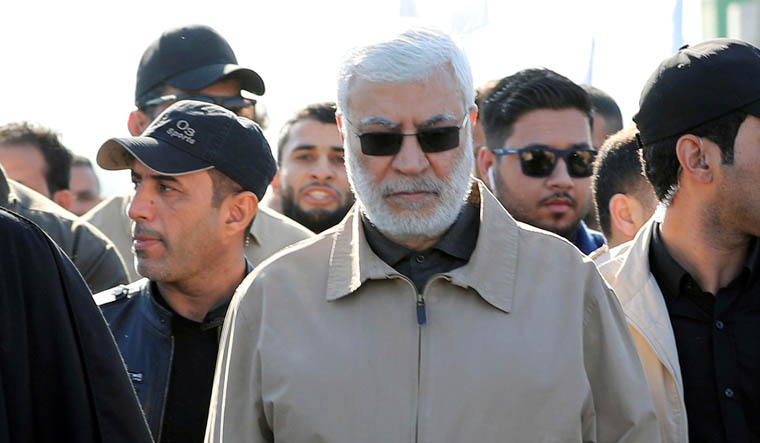The Western press had a popular sobriquet for the recently assassinated Iranian Revolutionary Guards commander Qassim Soleimani—"the shadow commander". It is difficult to overstate the importance of Soleimani in Iran; Andrew Exum wrote in The Atlantic, "I do not know of a single Iranian who was more indispensable to his government’s ambitions in the Middle East."
General Soleimani headed the external operations Quds Force for Iran's elite Revolutionary Guards, wielding his regional clout publicly since 2018 when it was revealed that he had direct involvement in top-level talks over the formation of Iraq's government. It was no surprise at the time for a man who has been at the centre of power-broking in the region for two decades.
On Friday, the US assassinated Soleimani in an air strike at Baghdad's international airport. "US President Donald Trump ordered the killing of Soleimani, who died in Baghdad in a decisive defensive action to protect US personnel abroad," the Pentagon said. "General Soleimani was actively developing plans to attack American diplomats and service members in Iraq and throughout the region. General Soleimani and his Quds Force were responsible for the deaths of hundreds of American and coalition service members and the wounding of thousands more," the Department of Defence said.
Outwardly, Soleimani, who has fashioned himself as a "fighter against the Islamic State and Al Qaeda", managed to build up a rockstar image in his home nation. He even had a huge following on Instagram. His profile rose suddenly when he was pushed forward as the public face of Iran's intervention in the Syrian conflict from 2013, appearing in battlefield photos, documentaries—and even being featured in a music video and animated film.
A survey published in 2018 by IranPoll and the University of Maryland—one of the few considered reliable by analysts—found Soleimani had a popularity rating of 83 percent, beating President Hassan Rouhani and Foreign Minister Mohammad Javad Zarif. Western leaders saw him as central to Iran's ties with militia groups including Lebanon's Hezbollah and Palestinian Hamas. But, he had repeatedly rebuffed questions on whether he would enter domestic politics.
In a rare interview aired on Iranian state television in October, he said he was in Lebanon during the 2006 Israel-Hezbollah war to oversee the conflict. To his fans and enemies alike, Soleimani was the key architect of Iran's regional influence, leading the fight against jihadist forces and extending Iran's diplomatic heft in Iraq, Syria and beyond. Soleimani served as Iran's pointman on Iraq.
"To Middle Eastern Shiites, he is James Bond, Erwin Rommel and Lady Gaga rolled into one," wrote former CIA analyst Kenneth Pollack in a profile for Time's 100 most influential people in 2017. "To the West, he is... responsible for exporting Iran's Islamic revolution, supporting terrorists, subverting pro-Western governments and waging Iran's foreign wars," Pollack added.
Dexter Filkins in the New Yorker noted that his power comes mostly from his close relationship with Khamenei, the guiding cleric for Iranian society, and that in a fractious Iranian foreign policy power regime—including Revolutionary Guard commanders, senior clerics, and foreign ministry officials—he was tied to every corner of the system. "He sits over there on the other side of room, by himself, in a very quiet way. Doesn't speak, doesn't comment, just sits and listens. And so of course everyone is thinking only about him," a senior Iraqi official told Filkins.
Following Soleimani's death, Trump tweeted an image of the US flag without any further explanation. Security sources told AFP the bombardment hit a Hashed convoy and killed eight people, including "important figures." Soleimani heads the Islamic Revolutionary Guard Corps' Quds Force and also serves as Iran's pointman on Iraq, visiting the country in times of turmoil.
"At the direction of the president, the US military has taken decisive defensive action to protect US personnel abroad by killing Qasem Soleimani, the head of the Iranian Revolutionary Guard Corps-Quds Force, a US-designated Foreign Terrorist Organization," the Pentagon said.
"This strike was aimed at deterring future Iranian attack plans," it added. The Pentagon said that Soleimani had orchestrated attacks on coalition bases in Iraq over the past months, including on December 27, the day the US contractor was killed. "General Soleimani also approved the attacks on the US Embassy in Baghdad that took place this week," it said.
A former head of Iran's Revolutionary Guards said revenge would be exacted on the United States for killing the commander in Baghdad on Friday. "Soleimani joined his martyr brothers but we will exact terrible vengeance upon America," Mohsen Rezai, who currently heads the Expediency Council, wrote on Twitter.
-Inputs from AFP, agencies










